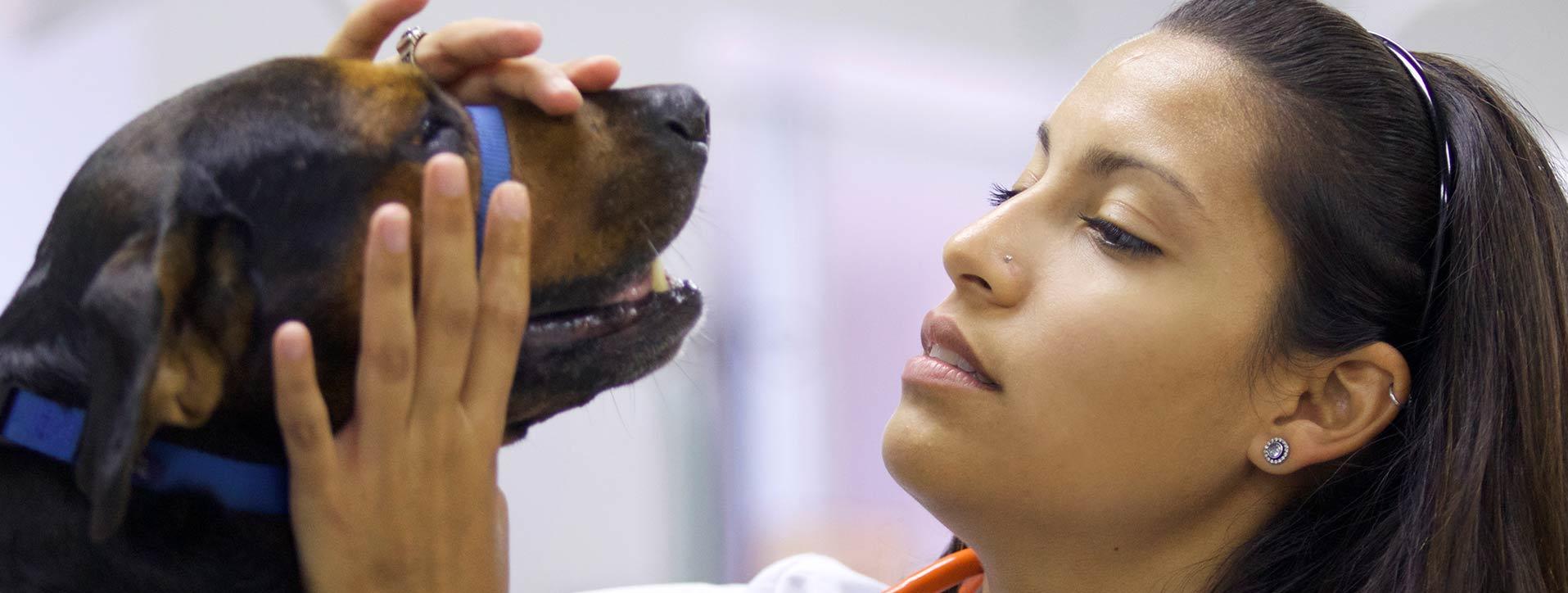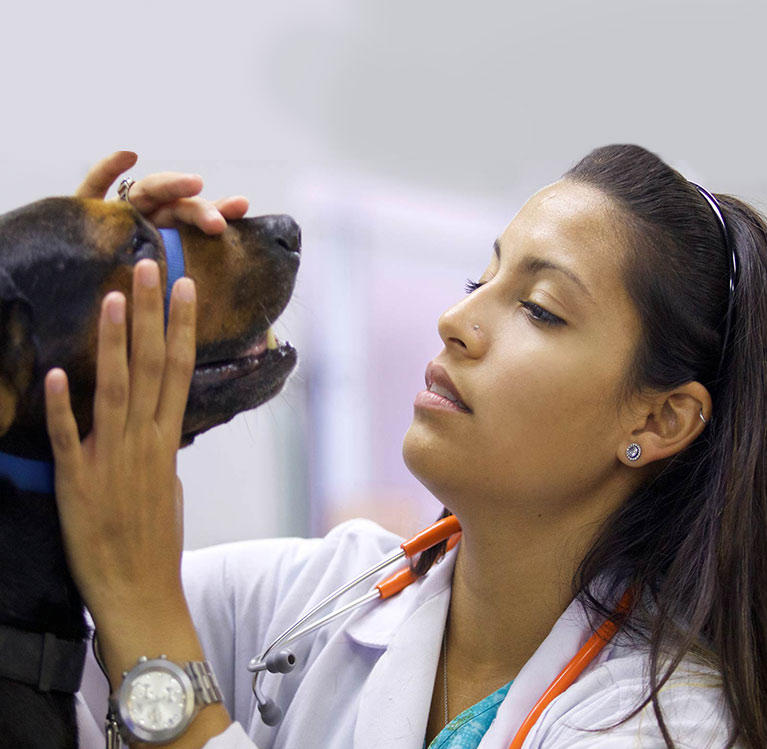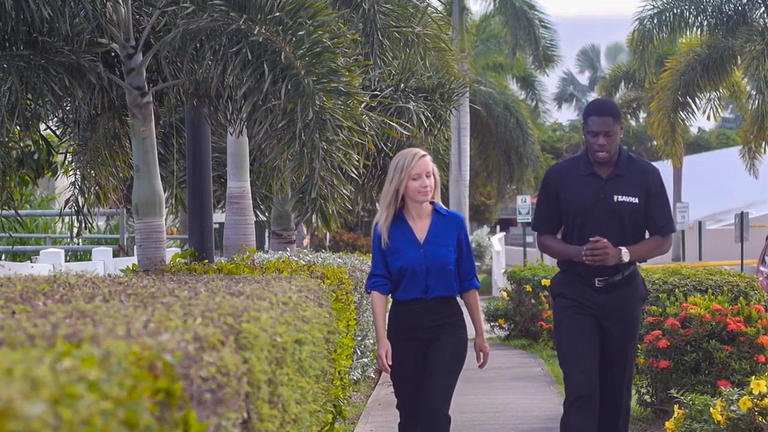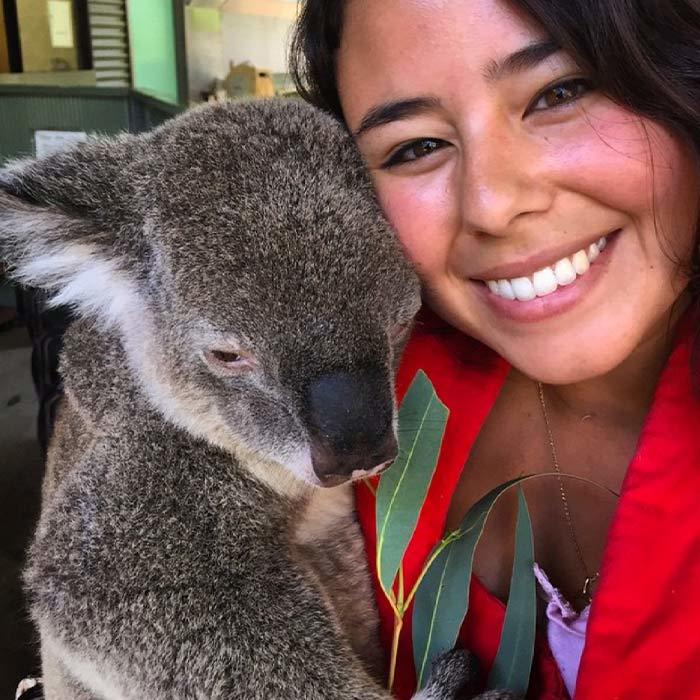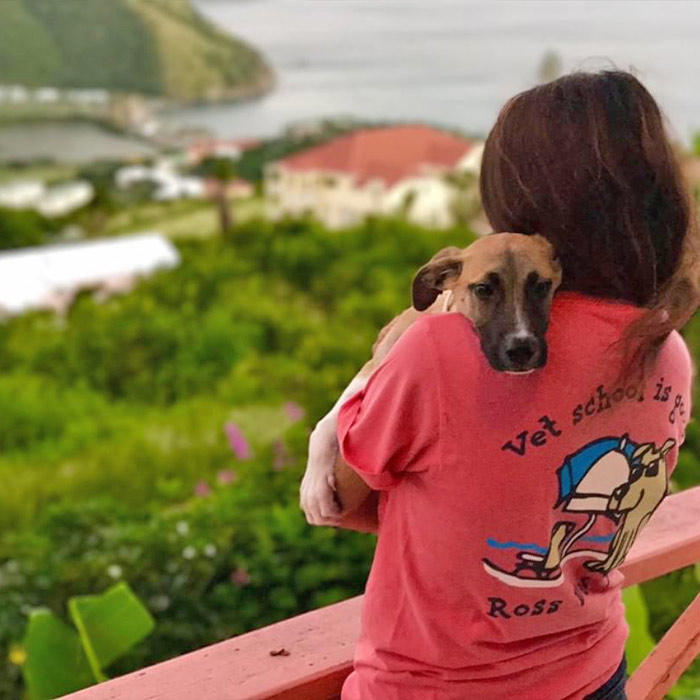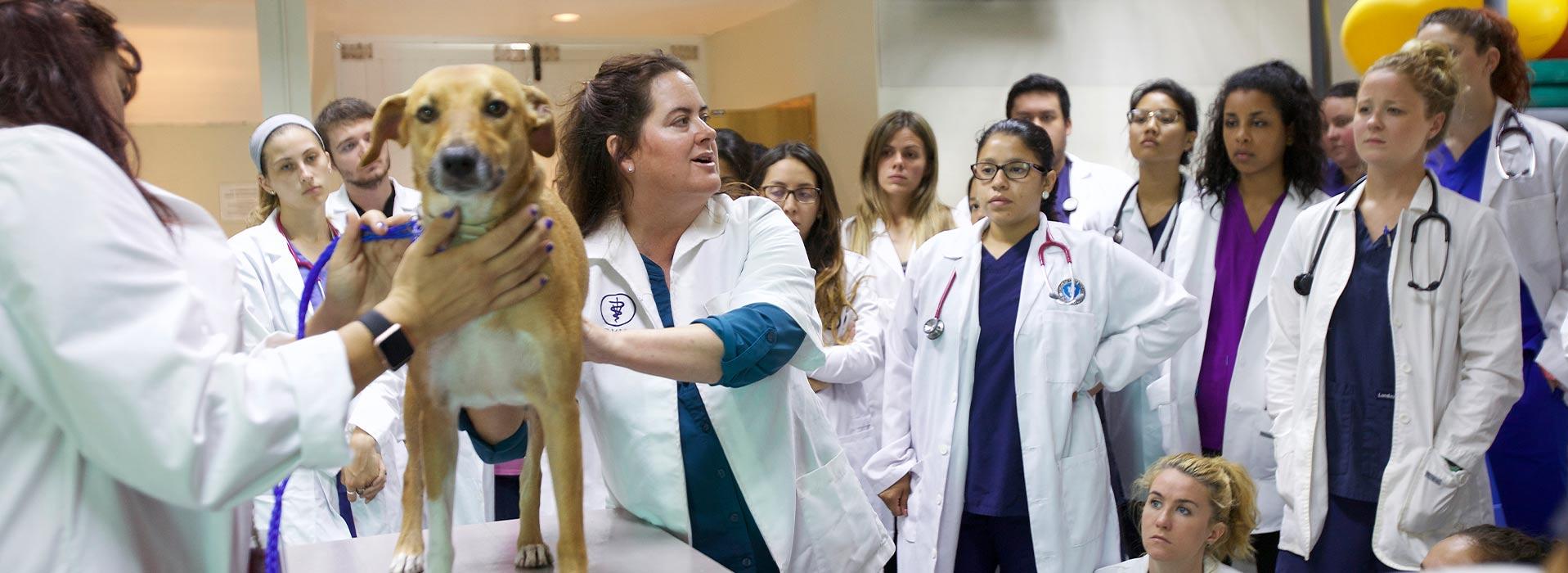VETERINARY SCHOOL PREP PROGRAM
We want you to succeed, and to help you do that, we offer a one-semester Veterinary Preparatory (Vet Prep) program that teaches foundational knowledge, skills, and terminology to set you up for success (and even give you a head start) in the Doctor of Veterinary Medicine (DVM) program.
Vet Prep is a bridge program designed to better prepare students for the rigors of vet school and provide additional assistance in one or more academic areas needed to excel in our DVM program. You may be wondering the specifics of how to prepare for veterinary school. This is your time to brush up on areas like anatomy, chemistry, and biochemistry. Practical labs on microscopy, parasitology, and bacteriology can better prepare you for your DVM degree while you acclimate to island life in St. Kitts.
The Vet Prep program is a valuable way to help make your dream of becoming a veterinarian come true. Students who are offered the program and pass are guaranteed a spot in the next first-semester class.
ROSS UNIVERSITY VET PREP PROGRAM
VET PREP PROGRAM REQUIREMENTS
- Completion of prerequisites, a minimum of 48 credits of college work and we strongly recommend that you complete your undergraduate program
- Completion of the equivalent of 150 hours of veterinary professional experience
- Proof of English proficiency, if English is not your first language
- Personal essay
- Official undergraduate transcripts
- Official GRE scores (optional)
- Two signed letters of recommendation (one academic and one professional)
- Curriculum Vitae or Resume
Explore the breakdown of prerequisite coursework required. These are organized by subject and include semester hours, laboratory requirements and other pertinent details. We require a minimum of 48 credits of college work, but we strongly recommend that you complete your undergraduate program.
We require a grade of C or better in all prerequisite coursework. Your required coursework includes:
Biology
Two semesters of General Biology (eight semester hours) with laboratory.
Cell Biology or Genetics
One course (three semester hours); Lab is recommended but not required.
Chemistry
One semester of General Chemistry (four semester hours) with laboratory.
One semester of Organic Chemistry 1 (four semester hours) with laboratory.
Biochemistry
One semester of General Biochemistry or Biochemistry 1 (three semester hours).
Note: Introductory or survey courses are not acceptable.
Physics
One semester of Physics 1 (four semester hours) with laboratory.
Note: Introductory or survey courses are not acceptable.
Mathematics
One semester of college-level mathematics (three semester hours) to be chosen among pre-calculus, calculus, and statistics.
English
One semester of English (at least three semester hours), preferably to include one semester of English Composition. Canadian students may satisfy English requirements in 3 possible ways: (1) 2 semesters of University humanities where essays composed at least 40% of the overall mark, (2) International Baccalaureate, and (3) Advanced Placement English.
Electives/Humanities/Social Sciences
Nine semester hours; one of the courses to meet this requirement must be one of the following:
- Comparative Anatomy
- Medical Terminology
- Microbiology
- Nutrition
- Physiology
- Spanish (or other foreign language)
- Public Speaking
- Introduction to business
VET PREP COURSES
Total Credits: 15
Provides the student with a clinical setting to integrate material that is taught in other Vet Prep courses. Within this clinical setting, the concepts of anatomy and physical examination will be demonstrated and then practiced by the student. This course integrates with the Case-based learning course. Clinical skills will be focused on small animals, however, other species will be introduced to emphasize comparative anatomy of common domestic species. Students will begin learning the process of acquiring information from a physical exam and applying it in order to formulate a clinical profile for an animal. Animal handling, restraint, and physical exam techniques will be demonstrated and practiced. Students are also introduced to the concepts of veterinary medical record-keeping, problem-based medical record, and the SOAP format.
The main goal of this course is to provide Vet Prep students an overview of basic concepts in microbiology and infectious diseases. Students will gain fundamental knowledge in bacteriology, virology, parasitology and immunology. In addition, students will be given a brief overview of special topics in microbiology such as pathogens involved in emerging diseases, food safety microbiology, zoonotic diseases, antimicrobial resistance, high consequence and economically important animal and human diseases.
A survey course focusing on properties of enzymes, carbohydrate, lipid and amino acid metabolism; water and water balance, membrane physiology and intercellular communication (transporters and receptors), acid-base fundamentals, endocrine system and an introduction to micro-anatomical identification of cells.
Designed to help students adjust to island life and professional school, including developing study and organizational skills necessary to attain success at Ross University School of Veterinary Medicine. The course also serves as an introduction to veterinary medicine and required core competencies, as well as gives the opportunity for students to learn more about the various disciplines within the profession from a variety of experts. The course is Pass/Fail based on class participation and attendance.
Introduces students to medical terminology that will be utilized in the veterinary curriculum. The course begins with basic directional/positional terms and then proceeds to terms that are pertinent to each body system. Scientific articles will be used to highlight the use of these terms. Short writing assignments and verbal exercises will be used to enable the student to practice using these terms.
The approach and considerations needed to progress through a clinical case will be introduced during this course. The class will examine thought processes, and how clinical presentations can be ordered to help advance through case care. A problem-oriented approach will be used to help explore the problem, formulate appropriate differential diagnoses, and develop a plan for its accurate diagnosis and treatment.
*Statistically representative of the September 2022, January 2023, and May 2023 incoming Vet Prep classes.
SUCCEEDING DURING AND AFTER VET PREP
Vet Prep does more than prepare you for vet school and the DVM program. It can also jump-start your involvement in research and student organizations. Several former SAVMA presidents are proud Vet Prep alums! Read Shaye Antal’s experience in the Vet Prep program and how it not only built her confidence but also allowed her to become involved in research opportunities even before starting her DVM.
PREPARE FOR STUDENT LIFE
Required Materials and Supplies:
- Stethoscope (a master cardiology stethoscope isn’t required)
- White lab coat
- Waterproof rubber no-slip work boots
- Scrubs (not green)
- Postman Blue Twill Coverall
Recommended Text:
- Lippincott’s Illustrated Reviews: Biochemistry, 6th ed.; Champe, P. C.& R. A. Harvey; ISBN# 9781451175622.
- Physiology, 6th ed.; Costanzo, L.S.; WB Saunders, Philadelphia, PA; ISBN# 9780323478816
Recommendations by former students (optional):
- Short-sleeved Coverall
- Rain poncho
- Clipboard
Visit the bookstore to purchase medical and school supplies or the spirit store. For a full list of what to bring and what not to bring read Preparing to Move to St. Kitts.
Bring your favorite study materials with you to St. Kitts and don’t forget to pack your:
- Laptop and charger
(iPads are provided in the DVM first semester) - Phone and charger
- Back up chargers
For a full list of what to bring and what not to bring read Preparing to Move to St. Kitts.
Develop successful strategies for managing course loads, test-taking, and proper study habits. Reach out to our Student Success Center (SSC) for academic support programs and services to set you up for success.
You Can:
- Schedule an individual study-strategy appointment
- Access Interactive learning workshops
- Get academic coaching
- Utilize teaching assistants
- Get a tutor
Block exams are every 3 weeks using ExamSoft®. These exams can be taken in any order: anatomy, cellular biology, microbiology, and pharmacology.
Still have questions about the Vet Prep program? We’d be happy to connect you to a student who has gone through it so you can hear firsthand the program’s benefits and how it can help you succeed.
FREQUENTLY ASKED QUESTIONS
There are two ways applicants are considered for the Vet Prep program:
1) There are three possible decision outcomes for a DVM applicant: accept, deny and Vet Prep. The Admissions Committee may offer a Vet Prep decision after the holistic review of a DVM application.
2) Prospective students can apply directly to the Vet Prep program using the following link.
Vet Prep is a 14-week program designed to provide aspiring veterinary medical students with a strong foundation in the basic sciences. Courses include introductions to microbiology, animal structural biology, and cellular biology and homeostasis. Introduction to clinical reasoning is a separate course, though its principles are used throughout the Vet Prep program. You may also benefit from a transitional course that introduces you to the academic veterinary medicine program and promotes and study skills.
Vet Prep instructors hold either a DVM, PhD or both in their field and have experience teaching medical, undergraduate or graduate-level students.
Vet Prep mimics a similar structure to the DVM program. Each week, you will participate in a combination of lectures and labs.
Individual instructors will determine the requirements and consequences for attendance, which will be approved by Curriculum Committee and described, in writing, at the beginning of each course in the course syllabi.
RUSVM is non-sectarian and does not close for the religious holidays of any specific denomination or group. Students who miss classes or laboratories without an approved excused absence will be responsible for the content of all missed course work. Examinations scheduled to occur on religious holidays will not be rescheduled.
As specified in the course syllabus at the beginning of a course, attending examinations and other required exercises is mandatory, except in the case an approved excused absence.
Students who do not successfully complete the Vet Prep program will not be admitted to the Ross Vet DVM program.
Vet Prep is offered in-person on our St. Kitts campus in the Caribbean.
Like our DVM students, Vet Prep students live in off-campus housing in St. Kitts. Our Housing Department provides housing assistance to students and will work with you to find affordable and secure housing that meets your needs prior to your arrival on island.
No, please note that the Vet Prep program is not eligible for Title IV funds through FAFSA® and you will be required to pay tuition out of pocket or by private loan. You can apply for financial aid before you begin Semester 1 of the DVM program via the FAFSA® form at https://studentaid.gov/h/apply-for-aid/fafsa. If you need any assistance or have any questions, please email or finaid@rossu.edu call us at 732-509-3051.



